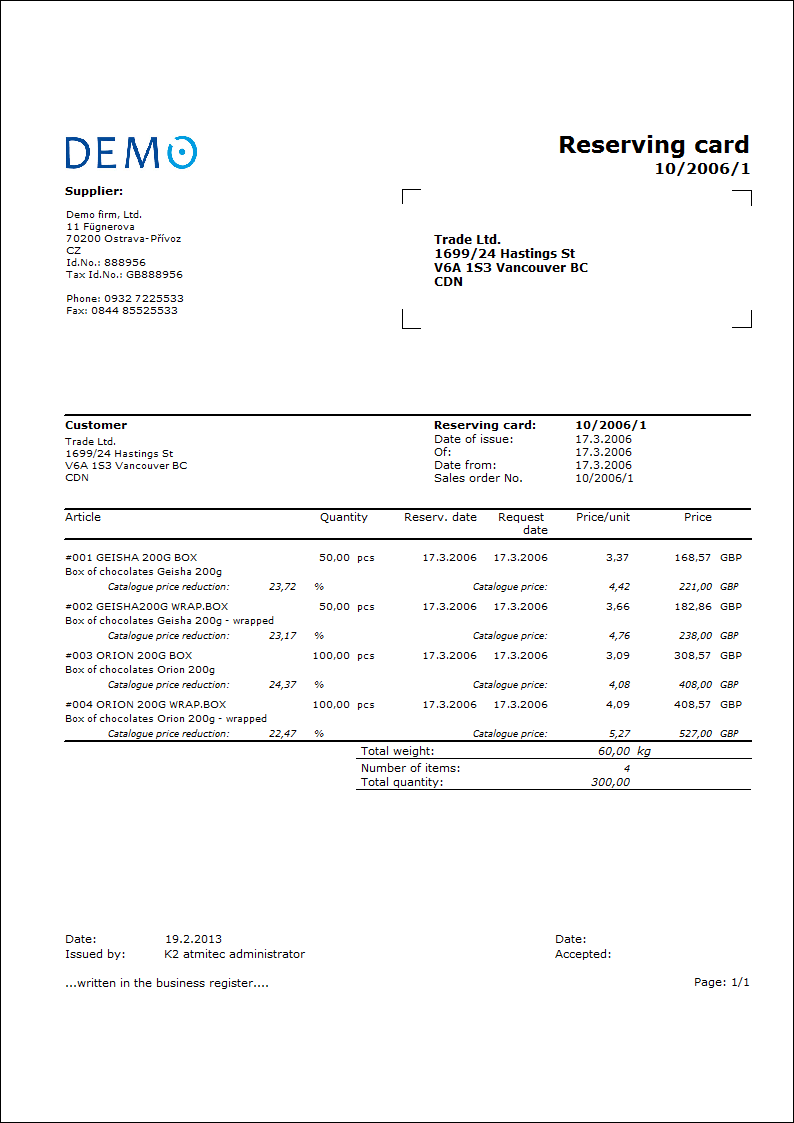Reserving Cards
On Reserving Cards articles that are to be prepared on the fixed term for a specific customer are recorded
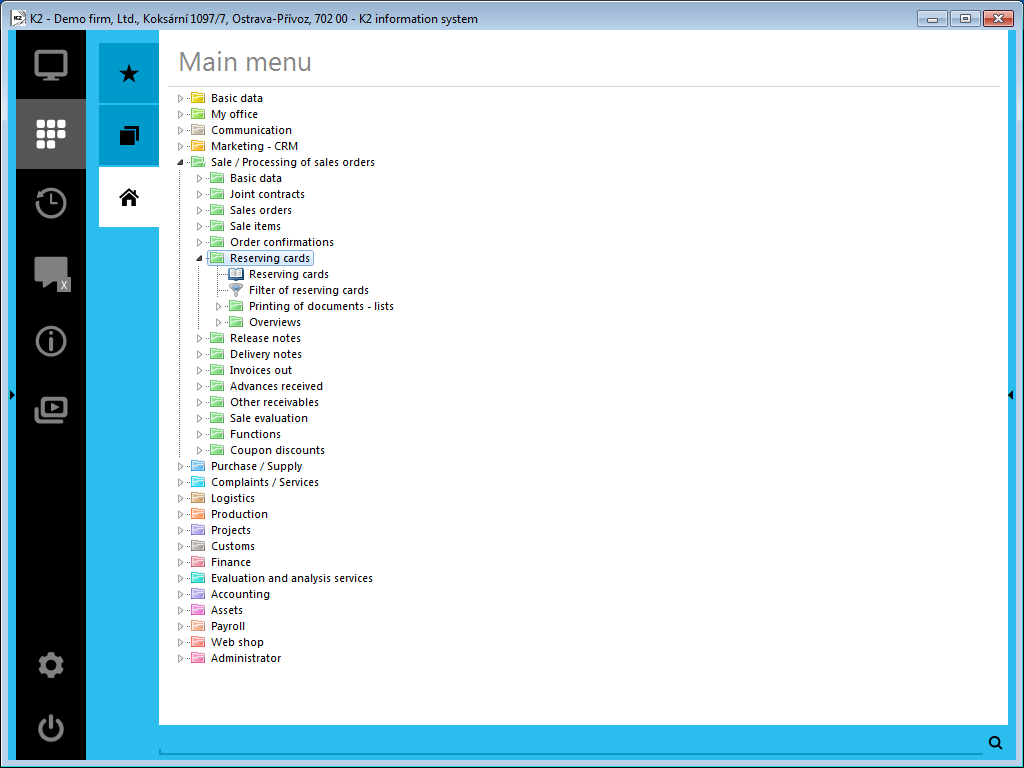
Picture: The open menu of the Sales / Processing of Sales Orders - Reserving Cards module
If you issue a Reserving Card for some articles, the given quantity will show as reserved in the stock records. There, the items from all Reserving Cards are added up. The RC link to the stock results from the Client Parameter setting on the 2nd page of the card – Coverage Independent of Information Stock.
Should we wish to block articles in stock for a specific customer, we issue a Release Note for this article. Thus the appropriate quantity of the articles in the stock records will be moved from the column 'Available' to the 'Assigned' one, which will guarantee that nobody else can assign those articles to another Release Note.
By confirming a Release Note, the released quantity is subtracted from the total quantity in the Reserved column.
Deleting an item from an unconfirmed Release Note will move the quantity stated in this item from 'Assigned' to 'Available' .
Deleting an item from Reserving Card will reduce the total quantity of Reserved on the item to half. The same result will be achieved if you assort the reserved article item to a Release Note. The article that has been blocked in stock for a specific customer will no longer show as 'Reserved'. The Reserving Card further remains in existence archived. If we deleted the articles from an unconfirmed Release Note, this quantity would reappear as Reserved again.
By means of reservations, it is possible to create an ordering policy, to automatically create delivery orders, etc.
It is also possible to post the Reserving Cards above all to the off-balance sheet accounts, and thus to achieve mapping of the calculated and planned costs to the Accounting and further to the economic analysis.
Book of Reserving Cards
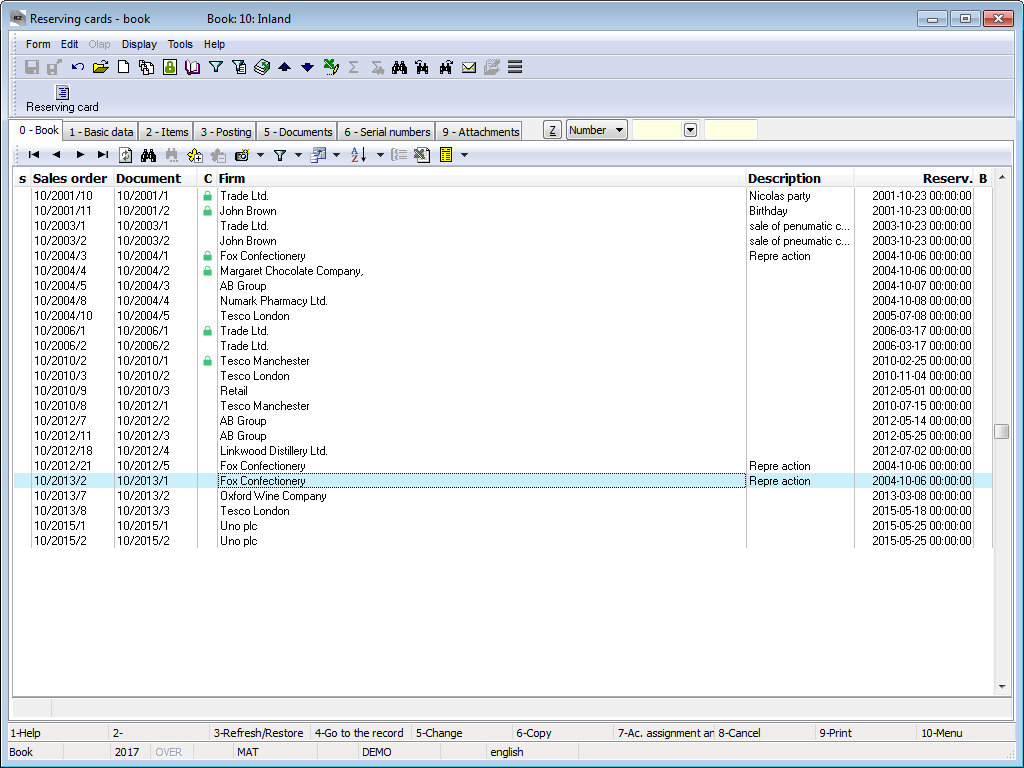
Picture: The Book of Reserving Cards
Note: The sum of planned stock prices of the individual items in the Reserving Card is stated in the heading of the individual Reserving Cards. These prices do not show in the heading if you check the Suppress Stock Price in Reserving Cards option in the User Parameters - page 2 - Purchase and Sale.
Further, as the default settings, the columns with the planned stock price are displayed on the 2nd and the 4thpage of Reserving Cards. If you check the above-mentioned option, the columns with he selling (invoiced) price are displayed as the default settings.
Reserving Card Document
Basic Data (1st page)
This page of reservation sheets is used to record the basic data of these documents.
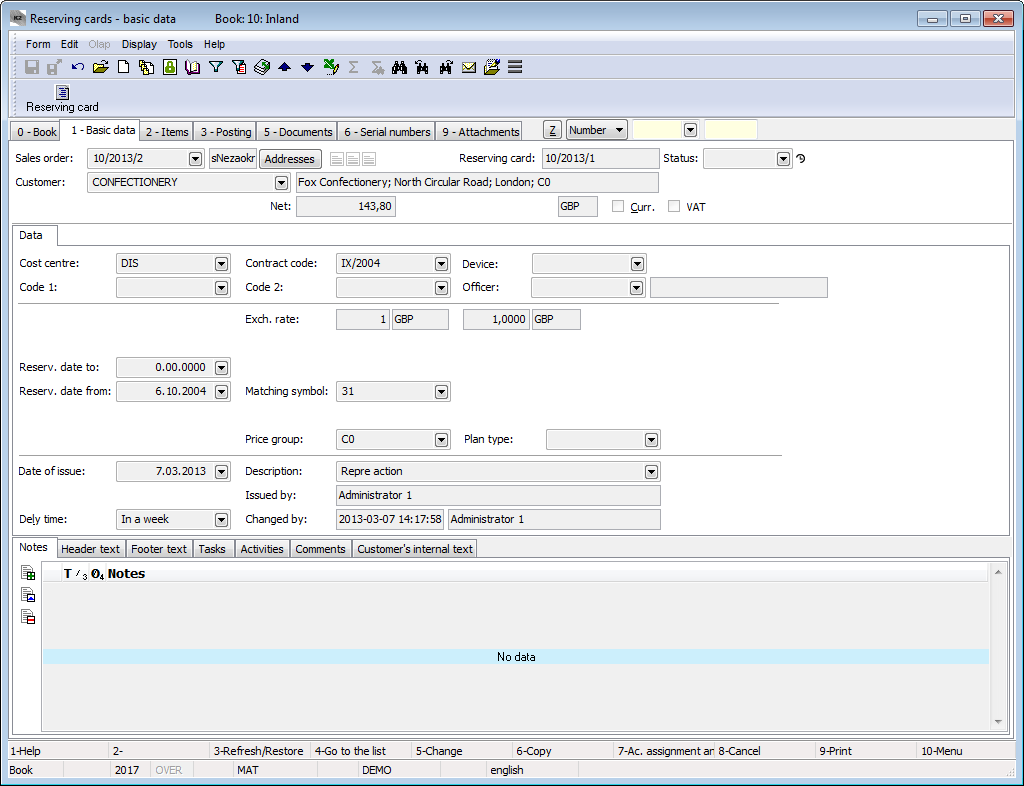
Picture: Reserving Cards - 1stpage Page chapter).
Field description:
Contract |
The number of the superior document, i.e. the Sales Order, which the Reserving Card is linked with. If the Reserving Card has been issued as a free document, this field will be empty. |
Addresses |
The button to display an addressee or the superior company. Closer description is in the chap. Addressee. |
Reserving Card |
The book, business year, and the number of the Reserving Card. |
Status |
The field for selecting from a code list that enables filtering of documents according to the selected status. |
Customer |
Name of the customer who the Reserving Card is issued for. |
Prices / Fields |
Switch to the table of tax groups. |
Prices |
The total amounts of the Reserving Card. The Gross price, Net price, and the amount of VAT are stated in this row. |
Currency |
The flag indicates that the document is issued in foreign currency. |
VAT |
This option indicates that the Reserving Card is issued with VAT. |
Cost centre |
The cost centre covered by the Reserving Card. |
Contract Code |
A random numeric or character code that serves to sort company activities. |
Code 1, Code 2, Officer |
The fields enable the user identification, eventually a link to the personnel data. For further description, see the Basic Code Lists - Code 1, Code 2, Officer chapter. |
Reserv. Date To |
The deadline of reservation of articles. |
Reserv. Date From |
The start date of reservation of articles. |
Exchange Rate |
If the Reserving Card is issued with a foreign currency (the Currency field is checked), the currency of the document and the exch. rate for recalculation are entered into this field. Here, it is displayed from a Sales Order only. |
Matching Symbol |
This field serves for setting the matching symbol definition of the accounting documents (see theAccounting - Matching Symbolschapter). |
Price Group |
The price group of the document header according to which the selling prices are determined. This price group is copied into the individual document items. |
Plan Type |
A plan type that is defined in the Book of Sale is entered into this field by default (see the Basic Code Lists and Supporting K2 Modules - Plan Type chapter). The plan type serves for classification of documents. |
Date of Issue |
The date of issue of the Reserving Card. |
Delivery Time |
The period within which article must be delivered. |
Description |
A random description of the document. |
Created |
The name of the employee who has issued the reserving card. |
Changed By |
The date and the name of the user who made the last change. |
It is possible to assign random types and kinds of the notes to the Reserving cards, eventually you can use the Header text or the Footer text. Further work description with The notes is listed in the Basic Code Lists and Supporting Modules K2 – Notes chapter The Internal Customer Text tab serves to display the customer's internal text. There are also the Tasks and Activities tabs. A closer description of work with the folders is stated in the Tasks - Document Folder and the Activities - Document Folder chapters.
The basic data of the Reserving card header are stated in the Data tab.
Field description:
Cost centre |
The cost centre covered by the Reserving Card. |
Contract Code |
A random numeric or character code that serves to sort company activities. |
Device |
A reference to the Device book. It is copied from a Sales Order into the subordinate documents. |
Code 1, Code 2, Officer |
The fields enable user identification, and eventually a link to the Officers book. For further description, see theBasic Code Lists - Code 1, Code 2, Officer chapter. |
Reserv. Date To |
The deadline of reservation of articles. |
Reserv. Date From |
The start date of reservation of articles. |
Exchange Rate |
If the Reserving Card is issued with a foreign currency (the Currency field is checked), the currency of the document and the exch. rate for recalculation are entered into this field. Here, it is displayed from a Sales Order only. |
Matching Symbol |
This field serves for setting the matching symbol definition of the accounting documents (see the Accounting - Matching Symbols chapter). |
Price Group |
The price group of the document header according to which the selling prices are determined. This price group is copied into the individual document items. |
Plan Type |
A plan type that is defined in the Book of Sale is entered into this field by default (see the Basic Code Lists and Supporting K2 Modules - Plan Type chapter). The plan type serves for classification of documents. |
Date of Issue |
The date of issue of the Reserving Card. |
Delivery Time |
The period within which article must be delivered. |
Description |
A random description of the document. |
Created |
The name of the employee who has issued the reserving card. |
Changed By |
The date and the name of the user who made the last change. |
Items (2nd Page)
Articles that are to be reserved for a customer are stated on the 2nd page of Reserving Cards. We insert a new item in the Change or in the New record by key Ins. If you issue an unassigned document, the Sale item form is displayed, into which you select a required article and enter the required data. If you issue assigned document, after pressing Ins select the items from the Header Items book.
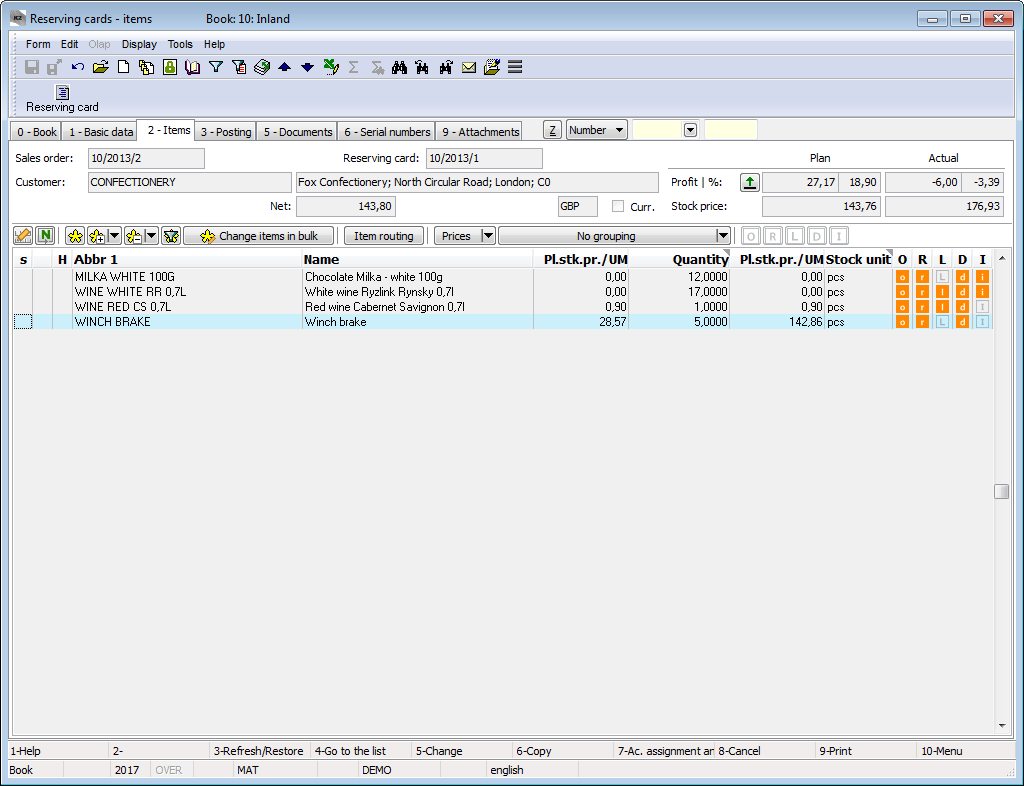
Picture: Reserving Cards - 2nd Page
The Sale Item form can be also activated by pressing Enter on the individual items of a Reserving Card either in the Change mode or in The Browse mode. In addition, the Change mode allows you to edit the data about quantity, its prices, it is possible to add the codes, etc.
Values in the document items, including discounts, can be adjusted in bulk with the Bulk Change of Items button in the Change mode. For further description of this function, see the Bulk Edit Document Items and Purchase and Sale Items chapters.
Account Assignment (3rd page)
For Account assignment is used on 3. rd Page Reserving Card tab. This issue is described in detail in The Accounting - Account Assignment and Posting chapter.
Documents (5th Page)
On 5. page of the Reserving Card card, an overview of all documents that are bound to this document by means of a superior document (order) is given. You can move between the individual documents by pressing Ctrl and the initial letter of the document simultaneously. It is also possible to display the selected document by pressing the Enter key.
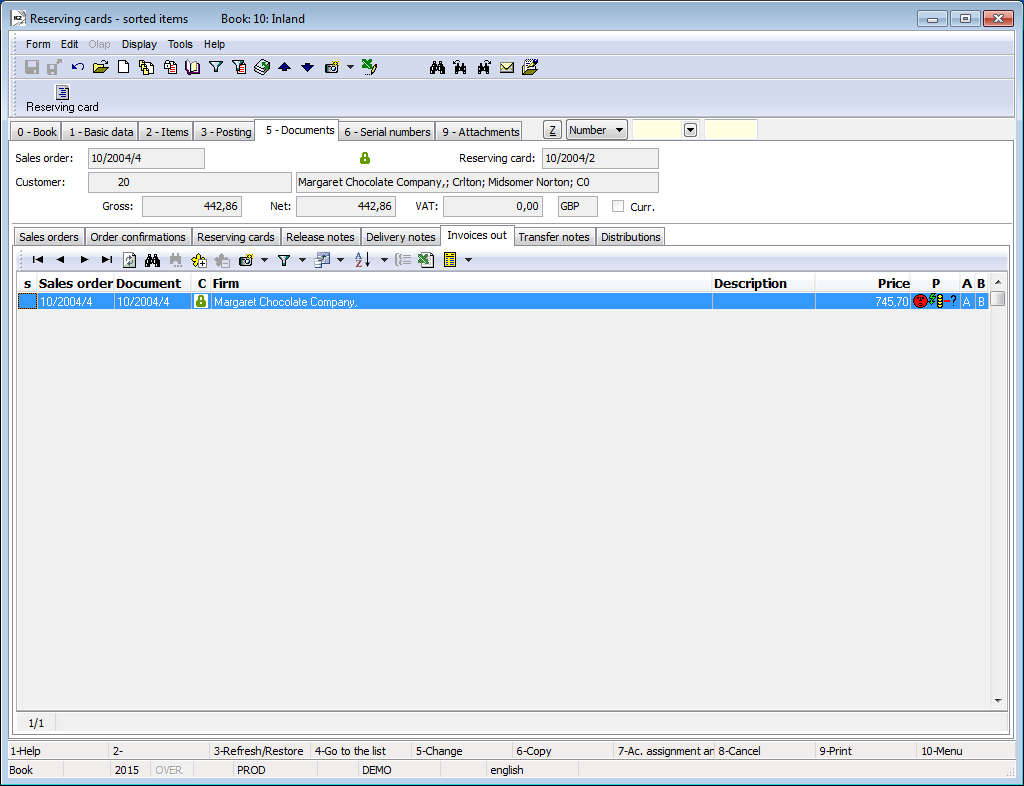
Picture: Reserving Cards - 5. page with the open Invoices Out tab
External documents (9th page)
On 9. page, any attachments and documents can be assigned to a Reserving Card. Further work description with the attached external documents and documents is stated in the chapter Basic Code Lists and Supporting Modules K2 – 9th Page..
Functions over Reserving Cards
Ctrl+F8 |
The Gantt Production Status chart - a chart displaying the status of production fulfilment of the Reserving Card items (page 0). Further description of the chart is provided in the Gantt Production Status chapter. |
Reports - Reserving Cards
Reserving Card
Process No.: EXP008 |
Report ID: SZAK051 |
File: REZ_DOK01='AM' |
Report description: Reserving Card. The report enables to save parameters in an "*.xml" file. Bulk export into the "*.pdf" file and sending by email is possible. |
||
Address in the tree: [Sale / Processing of Sales Orders] [Reserving Cards] [Print Documents - Lists] |
||
Report parameters:
BarCode - Yes Yes - a bar code is displayed. |
Batch - No Yes - batches for an item are displayed. |
BatchAttr - 1 0 - nothing is displayed; 1 - batch parameters are displayed; 2 - required batch parameters are displayed. |
BusinessRegister - 1 Information about the Business Register from the Own Company Settings is displayed. 0 - does not display information about the Business Register, 1 - displays a maximum of two lines of text about the Business Register, 2 - displays a maximum of four lines of text about the Business Register. |
CataloguePrice - Yes Yes - catalogue prices for items are displayed. |
CodeAndCentre - 0 The cost centre and the code are displayed according to the settings: value 0 - nowhere, 1 - in the header, 2 - in items, 3 - in both places. |
CodeOfCurrency - No Yes - the code of currency is displayed (e.g. USD). No - the sign of currency is displayed (e.g. $). |
CombineOrigItem - Yes Yes - merges the items with the same "OrigItemF" (if it is not different in price and other attributes). |
Contacts - 1;Addr;TaxNum;Tel1;Fax1;Email1;WWW The parameter has a total of 10 positions, the first three are fixed: 1. position: a user whose contacts from the user card (telephone, mobile, fax, email) are printed. Options: 0 - no user contacts, 1 - the user who has issued the doc., 2 - the currently logged in user, who prints the documents. 2. position: "Addr" - if it is specified, a company address is displayed. 3. position: "TaxNum" - if specified, the ID-No. and VAT Reg. No. are displayed. 4th - 10. position: listed types of electronic addresses of the own company (i.e. there may be up to 7 types). Example: (Contacts - 1;Addr;;TEL1;FAX1;WWW1): The Company Address will be displayed, behind which are the contacts from the user card, (tax numbers are skipped by an empty string on the 3rd place), then there are electronic addresses with Tel1 type, Fax1, WWW1. Note: If one piece of data is suppressed, there is no vacancy. Nevertheless, the default order in the report is always as follows: address, Tax No., user contacts, entered electronic addresses of own company. |
DefaultExport - No This is described along with other export parameters in the Report Parameters for Bulk Sending via E-mail chapter. |
Description - No Yes - information from the Description field from the 1st page of the document is displayed. |
DescriptionFromItem - Yes Yes - a supplement that is entered into the Description field in a document item is displayed. |
Discount - Yes Yes - a discount entered in item is displayed. |
DraftLabel - Yes Yes - if a document is not confirmed, "DRAFT" text is displayed in the background of a report. No - "DRAFT" is not displayed. |
Export_... - various parameters The report also includes export parameters described collectively for all documents in the Report Parameters for Bulk Sending via E-mail chapter. |
Interactive - No No - an initial form to enter parameter values is displayed. |
JCKindItem - A list of kinds that are printed in a tree of Job Cards (you have to separate more kinds by a semicolon). |
JCTreeLevel - 1 0 - all the levels of Job Cards are displayed for items, 1 - without Job Cards 2,3,4... - number of levels. |
K2Info - Yes Yes - displays an informative text about the document issued by the K2 system. |
KeepEnvelopeFormat - No No - the blank space under a place for envelope window is hidden. The saved place is multiplied, if the "ShowBarCode" parameter is set on "No". Useful if the user does not use the window envelopes and does not want to fold the printed document into an envelope according to the cam line guide of a document. Yes - the place is not hidden - the line between items and the address part will always be in one third of the page. |
LangAccordToParams - No If the report has to be printed in a language that is set in the "Field Language" and "Report Language" parameters, you have to set the value of the parameter to "Yes". |
LeftEnvelopeWindow - No Yes - the address of a customer is printed on the right side (determined for sending documents by mail in abroad where a window for envelope is on the left side); No - the address of a customer is on the left side. |
LeftShift - 5 By how many mm the edge of the report is shifted to the left (sets the print on a printer). |
LogoPictureFooter - 0 Parameter adjusts the footer logo display. If the parameter is empty, the footer logo is displayed according to the parameter settings Picture in Footer in the function Administrator - Administration of Own Companies. 0 - nothing is displayed, but a place is kept vacant (for a header paper), 1 - neither picture nor free place. File name with png suffix - specific picture in the Pictures directory of the given company. |
LogoPictureHeader - The parameter corrects the logo header. If the parameter is empty, the header logo is displayed according to the parameter settings Picture in Header in the function Administrator - System - Administration of Own Companies. 0 - nothing is displayed, but a place is kept vacant (for a header paper), 1 - neither picture nor free place. The conditions are to set the parameter KeepEnvelopeFormat to No. File name with png suffix - specific picture in the Pictures directory of the given company. |
Notes - Enter the comment type from the document header, which is to be displayed in the report into the parameter. To display more comment types, it is necessary to separate the individual types by using the semicolon (e.g. MAIL;CMR). If multiple comments of the same type are found, all of them are displayed. |
NumberOfItem - 1 0 - no number is displayed, 1 - the number of a Sales Order item is displayed; 2 - the Purchase Order number is displayed. Always in the "#001" format. |
OneLineItem - No Yes - the document item is always displayed on 1 row. |
ProportionalFont - Yes Yes - supplements are displayed in the Verdana font type, No - CourierNew font type. |
SerialNumber - No Yes - displays the serial numbers at the items. |
Sign - @Vyst;;; The parameter contains 5 positions: 1st position determines the person whose signature should be displayed. It may be a picture named according to the Logname of the user who has issued the document (@Vyst) or who prints the document - i.e. according to the current login (@akt) or the current Logname.
The value entered in the Stamp field in Administration of Own Companies is used by default. The path and the name of the file is entered here. The path may be entered by using the alias. Instead of entering the specific file name, it is possible to use %s. The picture must always be in the xxx.png format. If it is not filled in the Administration of Own Companies, the file will be searched in the Picturesdirectory.
An example of an entered task in the Stamp field in Administration of Own Companies: via alias: k2*DEMO\Pictures\stamp.png (searches the picture in the Client's path. The file stamp.png in the Pictures directory) via %s: k2*DEMO\Razitka\%s.png (the value entered this way enables to display signed bitmaps to all users who issue documents or are currently logged in and have the file in the PNG format in the directory (in this case the user created Stamp directory).
2nd position: picture height. 3rd position: distance from the left edge. 4th position: distance of a picture from the upper edge of the given section. 5th position: picture width. Example: (Sign - @vyst;27;47;0;83) prints the signature of the user who has issued the document, height is 27 points, left indentation of 47 points, by the upper corner. The picture is 83 points wide.
If the parameter is set to 0, the stamp will not appear. |
SortBy -The field is filled with the value of the field from Sale items (e.g. C_Zbo;Zkr or CF_CeJePlM). Items on a document will be sorted according to the parameter value. Parameter is empty by default. If the value of this parameter is specified, the items are not combined even if the CombineOrigItem parameter is set to Yes. |
StateOfOrigin - No Yes - a code of tariff and a country of origin are displayed for the items. If it is filled on a batch, information from the batch are displayed; otherwise the data from the Article card are displayed. |
SupplFromArticles - 0 - Nothing is displayed, Empty value - a Business Text from an Article card is displayed. If the parameter is filled in, and if there is an existing comment type on the Article card that is identical to the parameter value, the text of this comment is displayed. If the given comment type does not exist, the entered type of supplement from the notes on the Article card will be displayed (e.g. the DB type). If both comment and supplement type are identical, the comment has priority over the supplement. |
SupplFromCustomer - DZ 0 - Nothing is displayed, Empty value - a Business Text from a Customer card is displayed. If the parameter is filled in, and if there is an existing comment type on the Customer card that is identical to the parameter value, the text of this comment is displayed. If the given comment type does not exist, the entered type of supplement from the notes on the Customer (e.g. the DZ type). If both comment and supplement type are identical, the comment has priority over the supplement. |
SupplFromItem - 0 - Nothing is displayed, Empty value - displays the entered text from the Text tab from the document item. If the parameter is filled in, and if there is an existing comment type on the document item that is identical to the parameter value, the text of this comment is displayed. If the given comment type does not exist, the entered type of supplement from the notes on the document item will be displayed (e.g. the TX type). If both comment and supplement type are identical, the comment has priority over the supplement. |
SupplFromClient - TEXT The TEXT value displays information from the General information field from an own company. Otherwise it displays supplement type from the Client parameters. |
TaxRecapitulation - Yes Yes - the tax recapitulation is displayed. |
Title - The entered text is displayed as a title of the report. |
